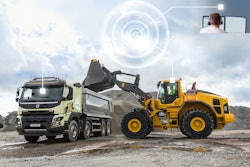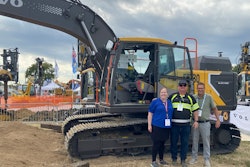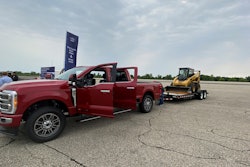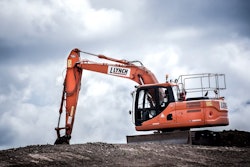
Kevin Lieberum, commercial truck brand manager for Ford Pro, talked with the Equipment Today team about the state of the construction industry. His major takeaways moving into the new year are the move to electrification and connectivity for vehicles. This Q&A gives more of his insights.
What was the construction industry’s biggest challenge in 2023?
The construction industry is working hard to adapt to rapidly evolving technologies and the shift towards electrification. A key area of focus has been integrating vehicle technology and connectivity to enhance efficiency and productivity on jobsites. Features such as Ford’s Pro Power Onboard have become integral to the construction industry. This technology, available in select Ford vehicles like the Ford F-150, Super Duty, F-150 Lightning and E-Transit, transforms these vehicles into mobile power sources. The system offers varying levels of electrical output—2.0 kilowatts (kW), 2.4 kW, 7.2 kW, and up to 9.6 kW, powering tools onsite or acting as mobile generators.
Fleet operators are prioritizing such features, akin to safety features, for their role in improving total cost of ownership. Pro Power Onboard … [converges] the need for a robust work vehicle with the capabilities of a modern worksite. The demand for such innovative features is increasing as customers seek vehicles that not only transport but actively contribute to a more productive work environment.
Is your company still experiencing fallout from the pandemic, including supply chain issues or other problems?
The major supply chain issues related to the pandemic have greatly improved throughout 2023. The pandemic didn’t just affect our company but also drove changes in the market and the industry overall that are still playing out. Supply chain constraints have forced our company to be smarter in reducing manufacturing complexity in our … operations while still delivering for our customers the Built Ford Tough products that they have come to love.
In what technological areas do you see the potential for the most innovation in 2024?
Customers are realizing the immense value of active modems in their vehicles, which effectively transform them into smart, connected vehicles. This shift enables a range of digital capabilities, from remote security to advanced telematics and remote video functionalities. We expect these services to grow in 2024.
For Ford Pro customers, this connected integration takes a practical and highly beneficial form through complimentary services like Ford Pro Telematics Essentials and E-Telematics for electric vehicles (EVs). These services offer fleet optimization software, enhancing the operational efficiency of commercial fleets. The [telematics] platform is specifically designed to support fleet managers in optimizing their operations. It provides instant access to vital vehicle data such as odometer readings, diagnostic trouble codes, recall notifications, and detailed information about engine hours and oil life.
Moreover, Ford Pro Telematics and E-Telematics offer real-time tracking of fleet health, driver behavior and vehicle location, facilitating a comprehensive overview of fleet operations, allowing for more effective management of resources and maintenance.
One of the standout features is vehicle security. With active modems, customers can unlock advanced security features, ensuring the safety and integrity of their vehicles and the valuable assets they carry. This aspect of connected vehicle technology is becoming increasingly important [because] it allows for real-time monitoring and response to any security concerns.
What innovations or improvements do you anticipate in construction equipment in 2024?
In 2024, Ford Pro is introducing … features for commercial trucks and vans, especially those requiring major upfits and body equipment.
A notable example is our Upfit Integration System (UIS), which is currently available on the all-new Super Duty and represents a major leap in digital integration with upfit equipment and the vehicle's systems. UIS allows aftermarket equipment makers improved access to the Super Duty's electrical system and signals, seamlessly integrating and operating their hardware into the truck’s digital displays. This system features an interface module that provides a seamless connection to the vehicle’s electrical system and enables conversions to be controlled via the SYNC 4 touchscreen. This innovation is particularly beneficial for customers who depend on body equipment and upfits for their work, like utility cranes or plows, offering enhanced control and efficiency.
In addition to UIS, another significant advancement is in the realm of machine learning with driver-assist technology, particularly with the introduction of the smart hitch and Pro Trailer Hitch Assist. This feature employs advanced machine learning technology to detect the hitch ball, trailer and coupler at distances of up to … 20 feet. The system aligns the hitch with the trailer coupler using the rear camera and corner radars, simultaneously controlling the truck’s speed, steering and braking to ensure precision. Ultrasonic parking sensors detect any obstacles in the truck's path, enhancing safety during the hitching process. The Pro Trailer Hitch Assist, which can be operated by pushing and holding a button while monitoring progress on the truck’s large center screen display, simplifies what was traditionally a two-person job into a more manageable single-person task.
These innovations underscore Ford’s commitment to advancing technology in construction equipment. As we move into 2024, we expect these advancements to not only make construction equipment more efficient and environmentally friendly but also safer and more user-friendly, aligning with the evolving needs of the industry.
Which construction sectors face the most hurdles in the move toward electrification? Alternative fuels? Automation?
The transition to electrification, alternative fuels and automation presents unique challenges across various construction sectors, with rural areas facing particularly significant hurdles. These regions require improvements to grid resiliency and infrastructure to support electrification, which is currently gaining momentum primarily in more densely populated areas. For electrification to achieve mass adoption, there's a crucial need for collaboration between federal, state and local programs, in conjunction with utility companies, to provide the necessary support and infrastructure.
How are the Internet of Things, software and connectivity affecting your company specifically and the industry as a whole?
Ford Motor Company, particularly through our Ford Pro division, is undergoing a fundamental shift to enhance the customer experience through increased connectivity and improved technology. This evolution is centered on providing tools that create substantial value for business owners. These include:
- Ford Pro Intelligence: This cloud-based suite of fleet management services offers comprehensive consultation on aspects like charging solutions and depot site design, aimed at optimizing energy costs and uptime. Integrated with Ford Pro vehicle software, it provides an extensive view of fleet vehicle information, tracking driver habits, vehicle location and downtime, aiding in optimizing fleet efficiency.
- Telematics Essentials: As a complimentary offering, Telematics Essentials provides crucial vehicle health data such as odometer readings, diagnostic trouble codes, oil life, engine hours and recall information for Ford vehicles. This service allows fleets to track and plan maintenance or repair services with local dealers, transforming fleet health and maintenance into actionable insights.
- Ford Pro Telematics: Going beyond the basics, Ford Pro Telematics offers advanced features like GPS tracking, insights on fuel efficiency, and driver behavior. This comprehensive system aids in lowering fleet [operating] costs and improving safety, providing detailed monitoring of various vehicle systems, from acceleration and braking to oil life.
- E-Telematics: Tailored for EVs, E-Telematics extends capabilities to monitor EV battery range, find charger locations, check the state of charge and energy consumption, and manage charging events. It's designed to maximize run time and includes features like fleet charge event monitoring and automated reimbursement for home charging.
- Vehicle Security: Ford Pro telematics offers features like Live Lock status for remote vehicle door locking/unlocking and Remote Zonal Locking for separate access control of the cabin and load doors. This system enhances fleet security and provides real-time security alerts, adding a layer of safety and peace of mind for business operations.
These tools collectively contribute to a more efficient, secure and connected fleet management experience, demonstrating Ford Pro's commitment to driving productivity and customer satisfaction. When construction professionals choose Ford Pro, they're investing in a comprehensive operational support system, designed to elevate their business efficiency and cater to their … needs in the dynamic field of fleet management.
Do you expect the infrastructure bill to affect your business or your customers’ businesses? How, if you can explain further?
The bipartisan infrastructure bill is great news for U.S.’s infrastructure and the transition to a zero-emissions transportation future. Ford is committed to leading the EV revolution and doing our part by investing tens of billions of dollars in EVs and making fully electric versions of our most iconic and popular vehicles. We look forward to continuing to work with our government partners to combat climate change, make it easier for people to move, and support American workers and manufacturing.
… Many of our commercial customers will be able to claim up to $7,500 per EV and plug-in hybrid vehicle [that] they buy with no restrictions on battery sourcing or manufacturing.
What will be the biggest challenge in 2024 for the industry?
One of the most significant challenges facing the industry in 2024 will be that fleet managers will need to operate traditional gas [or diesel] vehicles and EVs in one fleet. This shift necessitates a reevaluation of fleet management strategies to accommodate the differing needs of [traditional fuel] and EVs, particularly in terms of maintenance, charging and overall fleet operation. Ford Pro is positioned as a comprehensive solution to this challenge, offering a suite of services that cater to the needs of mixed fleets.
Our Ford Pro solutions combine advanced software, charging options, service and financing for commercial vehicles into one integrated platform. This unified approach is designed to assist businesses as they navigate the complexities of adopting connected and electrified vehicles across their operations.
Key to this transition is the management of vehicle health data, EV charging solutions and insights into vehicle tracking and driver behavior. Ford Pro offers tools that maximize fleet productivity by providing critical information on vehicle health and performance. This data is crucial for ensuring that fleets are operating efficiently and effectively, regardless of whether they run on gas or electricity.
Moreover, Ford Pro Intelligence addresses a common pain point among commercial customers: the lack of a centralized location to access comprehensive information across all vehicles and services. By offering consultation on topics like charging solutions and depot site design, Ford Pro Intelligence helps businesses streamline their fleet management processes, ensuring that they have the necessary support and resources to manage their mixed fleets effectively.
Another challenge in 2024 will be ensuring that businesses have the education and training needed for a smooth transition to EVs. As fleets incorporate more EVs, understanding the intricacies of charging infrastructure, vehicle maintenance and efficient fleet operation becomes paramount. Ford Pro's offerings are designed to ease this transition, providing businesses with the tools and support needed to manage their fleets effectively in an increasingly electrified and connected landscape.
Are there any other insights looking toward 2024 that you’d like to share?
As we look towards 2024, it's clear that technological advancements, particularly in the realm of EVs, are on an accelerated trajectory. This rapid adoption curve signifies a pivotal change in the industry, and it's imperative that businesses and consumers alike prepare for this shift. The transition to EVs is not just a future possibility; it's a present reality that's unfolding quickly.


















